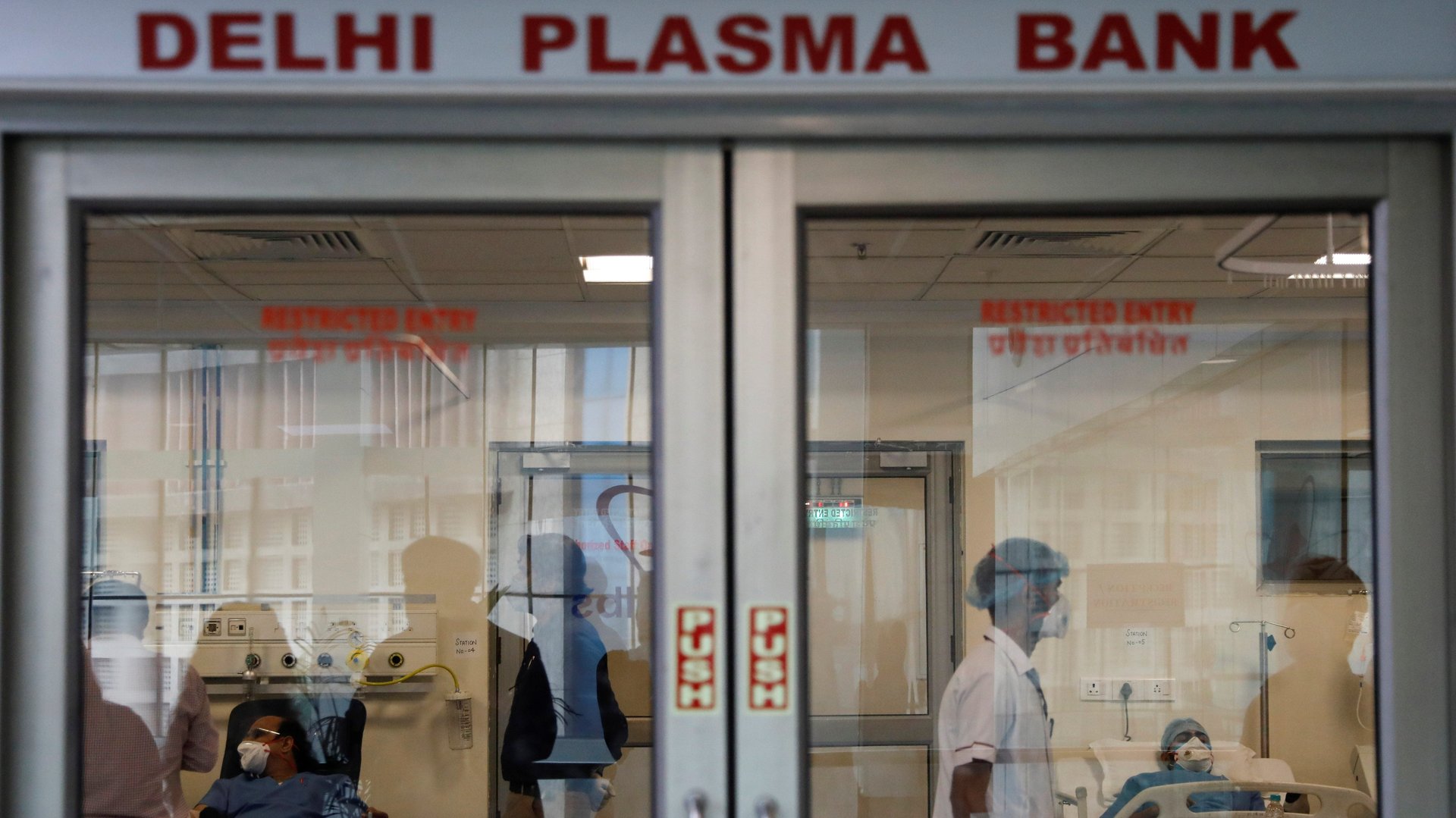It’s time India stopped using plasma therapy for Covid-19
As Covid-19 wreaks havoc across the country, thousands of patients and caregivers continue to search for plasma donors—despite a lack of scientific evidence to prove that it’ll work against the disease.


As Covid-19 wreaks havoc across the country, thousands of patients and caregivers continue to search for plasma donors—despite a lack of scientific evidence to prove that it’ll work against the disease.
Every day, countless calls on social media ask for plasma from a particular blood group, often for critical patients in the ICU. Those who have already donated plasma have been encouraging others to donate before getting vaccinated. Brands like dating app TrulyMadly and e-commerce website Snapdeal have jumped on this bandwagon to facilitate plasma donations.
Though lower in priority, plasma also continues to be a part of the Indian Council of Medical Research’s (ICMR) recently updated Covid-19 treatment protocols.
But this panicked frenzy for convalescent plasma, where plasma from a recovered Covid-19 patient is given to a recovering one, goes despite increasing evidence to support that unchecked plasma use could be contributing to more virulent mutations of the novel coronavirus.
A group of 18 clinicians, public health professionals, and scientists have written a letter to K VijayRaghavan, India’s principal scientific adviser, expressing their concern at the disconsonance between the ICMR’s findings from its own plasma trials and its guidelines for treating Covid-19 cases.
“Current research evidence unanimously indicates that there is no benefit offered by convalescent plasma for treatment of Covid-19,” they wrote in the letter on May 10. “However, it continues to be prescribed rampantly in hospitals across India. Families of patients run from pillar-to-post for getting plasma, which is in short supply, and reports of black-marketing are common,” they added.
What the clinical trials say
The ICMR’s PLACID trial was one of the first in the world, conducted across 39 hospitals in the country. As far back as September, this study found that plasma could not reduce mortality outcomes nor could it stop disease progression. There was some concern at the time that this study did not take into account the concentration of antibodies and which is why it was found to be ineffective. But, as the authors of the letter note, this treatment has limited success outside of laboratory settings.
The Recovery trial in the UK for plasma therapy had similar outcomes. “The large trial of 11,588 patients found no difference in death or proportion of patients discharged from hospital,” the Indian scientists wrote in their letter. A third trial from Argentina, the PlasmAr, also showed “no significant difference in ‘clinical status or overall mortality between patients treated with convalescent plasma and those who received placebo.’”
When seen together, large trials have proven the ineffectiveness of plasma therapy, but it continues to be widely prescribed in hospitals. Doctors claim they feel pressured by patients’ relatives to try whatever treatment available, and patients say they have no choice but to look for plasma when a hospital prescribes it.
The ICMR’s current guidelines place plasma as a low-priority experimental treatment, to be administered only in the first two to three days of symptom onset. But plasma needs to be administered in a hospital setting, and rarely does anyone testing positive for Covid-19 is hospitalised in the first couple of days since their symptoms start.
And there is a more serious problem with plasma therapy.
Plasma can lead to newer variants
Unchecked use of plasma in Covid-19 patients can potentially lead to new mutations in the virus. India, which is currently dealing with a deadly second wave, now has two variants of concern. These are likely also more transmissible.
Studies have shown the potential of plasma to lead to such mutations. “When I use convalescent plasma, I will expose that virus to multiple neutralising antibodies and add to their spectrum other than what the host has produced. You challenge the virus with multiple targets,” Indian epidemiologist Raman R. Gangakhedkar told the Informist publication on April 28. “And the virus will make an attempt to overcome in each cycle of replication. The more the number of people infected the more is the accumulation of mutations,” he said.
The authors of the letter to the principal scientific adviser echo this concern, especially about the “possibility of more virulent strains developing due to irrational use of plasma therapy which can fuel the pandemic.” They also pointed to the fact that several leading agencies—such as the National Institutes of Health and the Food & Drug Administration—recommend against the general use of plasma.
As an immediate measure, scientists and doctors now want the government to review its guidelines and remove plasma therapy as an option. “We request you to urgently review the guidelines and remove this unnecessary therapy which has no benefit but is only causing harassment of patients, their families and even COVID-19 survivors who are being pressured to donate plasma. This should also be twinned with clear instructions to blood banks across the country on the same,” they wrote.